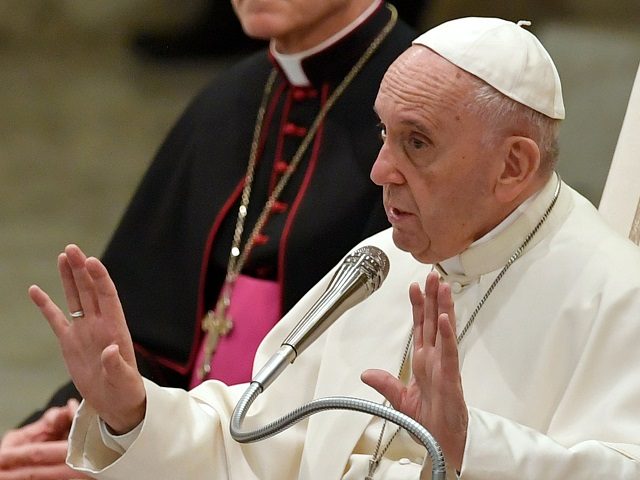The “malign power” of Satan is always in our midst, Pope Francis has asserted in a new teaching letter, and “poisons us with the venom of hatred, desolation, envy and vice.”
The pope is a firm believer in the devil and has repeatedly asserted that he is not a fairy tale character but a being who exists and who constantly works to try to separate people from God.
Satan is not “a myth, a representation, a symbol, a figure of speech or an idea,” Francis wrote in his letter called Gaudete et Exsultate (“Rejoice and Be Glad”), and falling into this mistake “would lead us to let down our guard, to grow careless and end up more vulnerable.”
“When we let down our guard, he takes advantage of it to destroy our lives, our families and our communities,” he said. “Like a roaring lion, he prowls around, looking for someone to devour,” he added, quoting from the New Testament first letter of Peter.
Acknowledging the existence of the devil is essential, the pontiff insisted, because the spiritual warfare Christians fight is not merely “a battle against the world and a worldly mentality” or a “struggle against our human weaknesses and proclivities.”
“It is also a constant struggle against the devil, the prince of evil,” he said.
In modern times, certain scripture scholars have downplayed the existence of Satan in the bible, suggesting that certain physical ailments with natural causes were frequently attributed to diabolical assault in the bible.
While acknowledging this, the pope asserted that such an explanation still does no tell the whole story.
“True enough, the biblical authors had limited conceptual resources for expressing certain realities, and in Jesus’ time epilepsy, for example, could easily be confused with demonic possession,” he said. “Yet this should not lead us to an oversimplification that would conclude that all the cases related in the Gospel had to do with psychological disorders and hence that the devil does not exist or is not at work.”
To understand the action of Satan, it is necessary to overcome the prejudices of scientific materialism, which only accepts the existence of physical realities that can be seen, weighed, and measured.
“We will not admit the existence of the devil if we insist on regarding life by empirical standards alone, without a supernatural understanding,” he wrote. “It is precisely the conviction that this malign power is present in our midst that enables us to understand how evil can at times have so much destructive force.”
Curiously, while forcefully reasserting his belief in the existence of the devil, the pope continues to be silent regarding the existence of hell, which has stoked rumors that he does not believe in eternal punishment for human beings who commit grave evils and die unrepentant.
A recent article in the Italian press sparked uproar and outrage when the former director of a major Italian daily said that in a meeting the pope had told him outright that he does not believe in hell.
Asked by the 93-year-old journalist Eugenio Scalfari, former director of La Repubblica, what he thought about the fate of souls who died in sin, the pope reportedly denied both hell and the immortality of the human soul.
“They are not punished. Those who repent obtain God’s forgiveness and enter the rank of the souls who contemplate him, but those who do not repent, and cannot therefore be forgiven, disappear. There is no hell, there is the disappearance of sinful souls,” the pope is reported as saying.
The confusion was aggravated by a pseudo-denial of the report by the Vatican press office, which only said that Scalfari had not quoted the pope verbatim. It did not refute the gist of the story but rather the wording, which confirmed in the minds of some people that the pontiff had probably said something very similar to what was reported by Scalfari.
Throughout his papacy, Pope Francis has often spoken of the reality of the devil in the clearest of terms.
He has spoken less of hell, although some of his statements would seem to indicate that he does believe in hell, or at least the possibility of hell.
In his message for Lent 2015, for instance, Francis wrote that “the danger always remains that by a constant refusal to open the doors of their hearts to Christ who knocks on them in the poor, the proud, rich and powerful will end up condemning themselves and plunging into the eternal abyss of solitude which is Hell.”
In November of the following year, the pope reflected during a homily warned Christians that “if you do not take care of your heart,” and “you always live far away from the Lord, perhaps there is the danger, the danger of continuing in this way, far away from the Lord for eternity. This is very bad!”
And in launching a powerful appeal to mafia bosses, Francis fired a shot across the bow that hell was a real possibility for them.
“The power, the money, that you possess now from so many dirty transactions, from so many mafia crimes, is blood-stained money, it is power soaked in blood, and you cannot take it with you to the next life,” he said.
“Convert, there is still time, so that you don’t end up in hell.”
For its part, the Catholic Church unambiguously affirms the existence of hell, and the Catechism of the Catholic Church states that immediately after death, “the souls of those who die in a state of mortal sin descend into hell, where they suffer the punishments of hell, ‘eternal fire.’”
“The chief punishment of hell is eternal separation from God, in whom alone man can possess the life and happiness for which he was created and for which he longs,” it reads.
Follow Thomas D. Williams on Twitter Follow @tdwilliamsrome

COMMENTS
Please let us know if you're having issues with commenting.